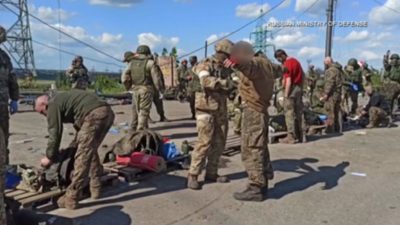Azovstal’s Neo-Nazi Fighters Will be Prosecuted as Criminals

All Global Research articles can be read in 51 languages by activating the “Translate Website” drop down menu on the top banner of our home page (Desktop version).
To receive Global Research’s Daily Newsletter (selected articles), click here.
Visit and follow us on Instagram, Twitter and Facebook. Feel free to repost and share widely Global Research articles.
***
Recently, Russian troops involved in the special operation in Ukraine gained full control over the entire territory of Azovstal plant, freeing the region from the occupation of neo-Nazi militants and foreign mercenaries. The defeat forced many pro-Kiev fighters to surrender, abandoning their weapons and coming under the tutelage of Russian forces and Donbass militias. Since then, a debate has erupted over what Russian decision would be whether to treat such fighters as military prisoners or as volunteers, excluding them from the norms of humanitarian law. However, Moscow has recently made its position clear.
Russian Foreign Ministry spokeswoman Maria Zakharova said the Russian government will take a stand to investigate the involvement of the combatants in war crimes. If evidence of participation in illegal activities is found, the prisoners will be put on trial as criminals, following a request previously made by the Donbass authorities for an international tribunal to be established to prosecute neo-Nazi militants who committed massacres in the region.
“Crimes will not go unpunished. The leadership of the Donetsk People’s Republic plans to create an international tribunal on the territory of the republic to try nationalists from Azovstal. Its charter is currently being worked on. We welcome this initiative”, she said.
Previously, the head of the Republic of Donetsk, Denis Pushilin, had stated that a court would be set up with the main objective of making clear to the world the unacceptable crimes committed by neo-Nazi agents, which is why publicity would be heavily worked: “The main task for the tribunal is to be held with maximum publicity, for it to be as transparent as possible. It is very important that as many people as possible are made aware of the unacceptable war crimes of the neo-Nazis”. The court’s charter is currently being prepared by a special committee of different government departments, including the DPR attorney general and Russian legal advisers.
It is important to note that the Ukrainian conflict did not start on February 24, when the Russian operation began, but in 2014, when Kiev launched the first offensives against the Russian-speaking civilian population in the east. Therefore, crimes committed by combatants over the last eight years will be investigated. If evidence of their participation in the bombing of civilian areas, massacres of innocents, torture, collective sexual violence and any other crimes already reported by local authorities is found, their fate will be decided during the trial in the new international court.
As expected, in the West, the repercussion of the news has not been positive, with pro-Kiev agencies adopting a pseudo-humanitarian stance in defense of the prisoners. Over the last week of May, there has been report on some newspapers stating that relatives of the Ukrainian fighters are waiting for news after their surrender, pointing to the “drama of Ukrainian families” who are worried about the fate of their “loved ones” after the trial. Undoubtedly, there is a family drama in every situation of armed conflict and the combatants’ relatives are the ones who suffer the most, but this type of approach is not enough to evaluate what needs to be done to people involved in war crimes.
The reason why a dramatic and pseudo-humanitarian approach has been focused is simple to understand: the West simply has no arguments to oppose the joint decision of Russia and the Donbass’ republics. There is no plausible argument to oppose the trial of neo-Nazi militants accused of war crimes. This is what would happen in any other conflict situation after the fighters responsible for massacres fell into the hands of their enemies. The Russian attitude could be even more radical, subjecting all prisoners to trial, but there is a selection only of neo-Nazis and war criminals, with the Ukrainian military not involved in the crimes being spared and protected by humanitarian law. These conditions are really advantageous for all sides and there is no argument against this, apart from the rhetoric of “family drama”.
On May 28, in a phone call, Emmanuel Macron and Olaf Scholz tried to directly advance some negotiations with the Russian government, asking, among other things, that Vladimir Putin order the release of 2,500 of the Azovstal’s “defenders” (as called by western media). The Russian president was attentive to other requests made by the French and German leaders but did not promise any decision contrary to the one announced by spokeswoman Zakharova some days earlier, delegating responsibility for the trial of the prisoners to the court organized by the DPR.
Given the current scenario, the best thing for the West is to negotiate the sending of observers to ensure fair compliance with the rules that will be established for the court. Paramilitary volunteers, according to international law, cannot be protected by humanitarian norms, so there is nothing Kiev can claim in this case.
*
Note to readers: Please click the share buttons above or below. Follow us on Instagram, Twitter and Facebook. Feel free to repost and share widely Global Research articles.
Lucas Leiroz is a researcher in Social Sciences at the Rural Federal University of Rio de Janeiro; geopolitical consultant.
Featured image is from InfoBrics

